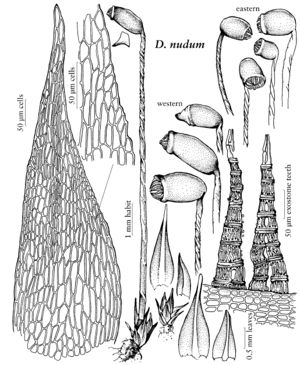Difference between revisions of "Disceliaceae"
FNA>Volume Importer |
imported>Volume Importer |
||
| (3 intermediate revisions by 2 users not shown) | |||
| Line 40: | Line 40: | ||
|family=Disceliaceae | |family=Disceliaceae | ||
|illustrator=Patricia M. Eckel | |illustrator=Patricia M. Eckel | ||
| + | |illustration copyright=Flora of North America Association | ||
|distribution=North America;Europe;Asia. | |distribution=North America;Europe;Asia. | ||
|reference=duckett2003a;shaw1985a | |reference=duckett2003a;shaw1985a | ||
| Line 45: | Line 46: | ||
|publication year= | |publication year= | ||
|special status= | |special status= | ||
| − | |source xml=https:// | + | |source xml=https://bitbucket.org/aafc-mbb/fna-data-curation/src/2e0870ddd59836b60bcf96646a41e87ea5a5943a/coarse_grained_fna_xml/V27/V27_272.xml |
}}<!-- | }}<!-- | ||
-->[[Category:Treatment]] | -->[[Category:Treatment]] | ||
Latest revision as of 21:25, 5 November 2020
Plants annual, minute, arising from a perennial persistent protonema. Stems erect, to 0.2 mm, completely enveloped in leaves. Leaves with costa weak or absent, brownish or with little chlorophyll, exterior leaves 0.2–0.4 mm, interior to 1 mm, acuminate, ovate to oblong-lanceolate, margins entire to crenulate by bulging cells; laminal cells elongate-hexagonal to rectangular, thin-walled, 85–100 × 12–16 µm, smooth. Specialized asexual reproduction by 2-celled starch-filled rhizoidal gemmae. Sexual condition functionally dioicous; perigonium of 3–6 leaves surrounding a few short antheridia and yellow, club-shaped paraphyses; perichaetium with few brownish, weakly chlorophyllose leaves, these representing the plant. Seta erect, twisted to right when dry, 4–30 mm or more. Capsule wide-mouthed, 0.4–0.7 mm, pale to dark brown when mature, stomata absent; annulus in 1–2 cell rows, deciduous; peristome of 16 reddish brown to orange-yellow lanceolate exostomial teeth, to 0.3 mm, with vertical striations on exterior face, often with longitudinal perforations, endostome delicate, as a sometimes discontinuous membrane adhering to exostomial teeth; operculum conic. Calyptra smooth, sometimes persistent on seta proximal to capsule. Spores 20–30 µm.
Distribution
North America, Europe, Asia.
Discussion
Genus 1, species 1.
Disceliaceae is widely distributed in the Northern Hemisphere but always rare. It is predominantly temperate, but also boreal at lower elevations.
Selected References
Lower Taxa
Illustrations
| Family ⠉ | Taxon | Illustrator ⠉ | |
|---|---|---|---|
 | Disceliaceae | Discelium nudum | Patricia M. Eckel |